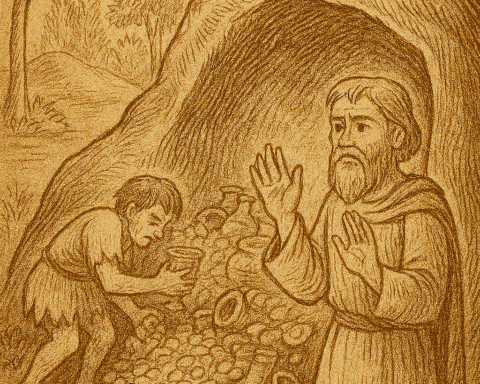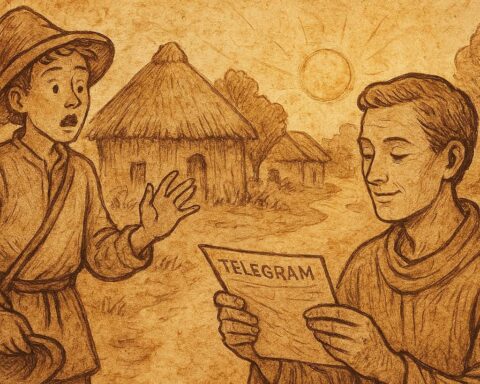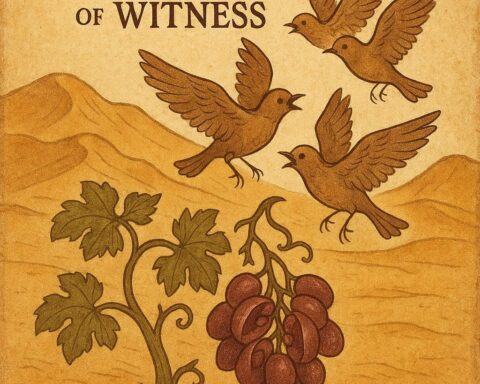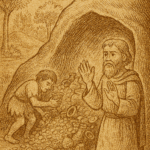Greed is a shadow that follows every man, but wisdom is the torch that reveals its path. In an old Oceanian village, where palm trees bent toward the sea and the moon guided fishermen back to shore, there lived a wealthy old man whose name was whispered with both respect and envy. His riches were not only in gold but also in yams, taro, and sacred mats that marked his standing in the community. The focus keyword here is greed, for it is the heart of this tale and the lesson it seeks to preserve.
The old man, though rich, was generous. Each festival, he gave gifts to children and hosted feasts where laughter flowed like river water. Yet, where generosity shines, greed lurks close by. A cunning robber from the neighboring coast heard of the old man’s wealth and decided to claim a share, not with honor or toil, but with theft. He hid in the shadows of the man’s great house, where torches burned low and the fragrance of roasted fish filled the air.
As the old man counted his woven baskets of shells and bags of coins, the robber watched with eyes sharpened by greed. When the elder stepped out to fetch another chest, the robber seized two bags and fled into the night. By the time the old man returned, his treasure was gone, and only silence mocked him. He searched every corner, but greed had moved swifter than wisdom, leaving him puzzled and grieving.
At dawn, fate revealed itself. The old man crossed paths with the robber outside the village. The thief’s face was uneasy, his steps unsure. Suspicion burned in the elder’s heart, for greed cannot hide its stains. Yet, without proof, the matter was taken before the chief and the council of judges. The robber, trembling with fear, knew the noose of justice was tightening.
Desperate, the robber sought help from a man known for his sharp mind. This old advisor, wise in words but blind to morality, agreed to help if he received half of the stolen wealth. Driven by greed, the robber agreed without hesitation. The old man instructed him to disguise himself: to tear his clothes into rags, ruffle his hair, smear his skin with ashes, and answer every question with the sound of a cow “Moo.” Thus armed with deception, the robber went before the council.
When the judges questioned him, he bowed and muttered, “Moo, moo.” When pressed harder, he rolled his eyes and groaned, “Moo, moo.” At last, anger overtook the judges. They dismissed him as a madman unworthy of trial. The robber walked away laughing, and his heart swelled with triumph. But it was not wisdom that saved him it was trickery born of greed.
Later, the wise old advisor came to collect his share. But when he demanded payment, the robber stared blankly and replied only, “Moo.” Again and again, “Moo.” The advisor grew frustrated. His own greed had betrayed him, for he had placed faith in a thief. The robber, now drunk on pride, kept everything for himself. The helper went home empty-handed, regret heavy on his spirit.
Thus, the story spread through the island villages. Elders recited it by the fire to warn the young that greed consumes not only the foolish but also the clever. In the end, both robber and advisor were prisoners of their own desires. The old man, though wronged, was remembered with respect, while the thief’s name became a curse.
Moral of the Story
This tale teaches that greed devours trust, poisons alliances, and blinds the heart. What begins as theft ends in betrayal, and those who profit from injustice will eventually choke on their own deceit. In Oceanian wisdom, wealth is not measured by what you steal but by what you share.
Knowledge Check
1. What is the main lesson of the Oceanian folktale The Robber and the Old Man?
The story shows how greed destroys trust and leads to betrayal.
2. Why did the robber disguise himself as a madman in the story?
The robber pretended to be mad to escape punishment, revealing how greed drives deception.
3. How did the judge react to the robber’s “Moo” answers?
The judge dismissed the trial, proving how greed can sometimes escape justice temporarily.
4. What role did the old advisor play in the tale?
The advisor helped the robber but was betrayed, showing how greed punishes even the clever.
5. How does the folktale reflect Oceanian culture?
The tale emphasizes community values, respect for elders, and warnings against greed.
6. What is the final moral of The Robber and the Old Man?
That greed never satisfies it only multiplies hunger until it destroys both thief and ally.
Cultural Origin: Adapted in the style of Oceanian storytelling tradition.






